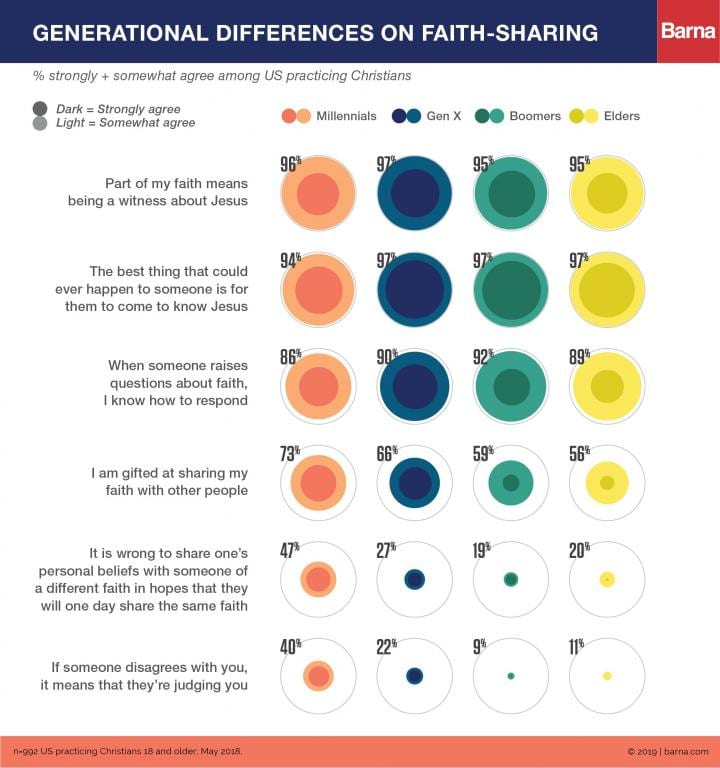Three Reasons to Interpret this Research Much Differently…
Trust me, I get click-bait. And, quite possibly, I hope, that these interpretations of this research leading to these misleading titles are only for the purpose of click-bait… (although, that doesn’t make their titles feel too much better, as I’m typing it out). Yet, sadly, I think these articles, and quite possibly, this research was done with an agenda behind it.
It’s the old saying used by statisticians in that, “Figures will not lie but, liars will figure.”
This is the danger of mixing politics, religion, and any research surrounding it…
Which, leads me into my three reasons for this particular research being interpreted (or used) incorrectly:
One.
First, in this study, they use words such as “witness” and “faith” which these two words being used repeatedly, let alone in the same sentence, within this study are words in which many of associate with evangelicalism. And, as I’ve spoken about previously, evangelicals today don’t even identify as “evangelicals” as we’ve all come to acknowledge the fact that this is a term that comes with a ton of baggage in which, again, evangelicals themselves don’t want to be associated with, at least, right off the bat.
So, this naturally, will lead to many of us as millennials being extremely hesitant to say that we “strongly agree” with a statement put out by a renowned evangelical Christian research cohort saying, “Part of my faith means being a witness about Jesus” [verbatim].
Two.
Secondly, we’re seemingly leaving our “silos” and echo chambers more often than our parents (the Baby Boomers).
As Barna goes on to highlight the fact that, “Younger Christians tend to be more personally aware of the cultural temperature around spiritual conversations. Among practicing Christians, Millennials report an average (median) of four close friends or family members who practice a faith other than Christianity; most of their Boomer parents and grandparents, by comparison, have just one. Sharing the gospel today is made harder than at any time in recent memory by an overall cultural resistance to conversations that highlight people’s differences.”
It seems as if many have been interpreting this data to mean that we’re becoming heathens because we’re now in a relationship with those outside of the four walls of our church.
It’s quite the opposite. As people viewing this as such feels like it’s more of a “cup half-empty” type of perspective. Straight up, pessimistic. Why not choose to see this as us having more of an opportunity to love our neighbors?
Three.
Last but not least, just because we’re not sharing our faith in the same way our parents have or, how our pastors say we should, this does not mean we’re not sharing our faith.
I’m left wondering if this research focussed solely on verbal forms of evangelizing(?).
As many of us have heard the quote before, “Preach the Gospel at all times. When necessary, use words (not St. Francis of Assisi).”
Most of us know from this quote that evangelizing is more than just verbal forms of preaching, debating, dialoguing, or conversing…
Millennials, as I am one, would contend the detriment of preaching a gospel in which we don’t live by.
The Disconnect…
The late Brennan Manning said it best, “The greatest single cause of atheism in the world today is Christians, who acknowledge Jesus with their lips and walk out the door and deny Him by their lifestyle. That is what an unbelieving world simply finds unbelievable.”
Much of our hesitancy in “evangelizing,” if there is any, is in regard to our not wanting to represent many of the institutions we grew up attending [as children]; this is as opposed to us not wanting to share our faith with our friends.
“…I quit being a Christian. I’m out. In the name of Christ, I refuse to be anti-gay. I refuse to be anti-feminist. I refuse to be anti-democrat. I refuse to be anti-science. I refuse to be anti-life. In the name of Christ, I quit Christianity and being Christian. Amen.”
— Anne Rice
As I’ve stated in a previous post:
It’s not that we don’t believe in God or that we’ve “lost faith in Jesus”… it’s that we don’t believe in your God and have come to find your [white version of] Jesus to be nothing but a sham.
Just because we’ve left our parents institutions doesn’t mean that we’re not still part of the Church.
This research comes across as a bizarre manipulative ploy in, once again, shaming us as millennials to get back on board of their institutions already sinking ships… Ironically, Barna highlighted these reasons in past research on millennials in Kinnaman’s book You Lost Me: Why Young Christians Are Leaving Church . . . and Rethinking Faith.
Which, brings to light a question I’ll be addressing later on this week or next “Are Churches Simply Faking Inclusion and ‘Multi-Culturalism’?”















